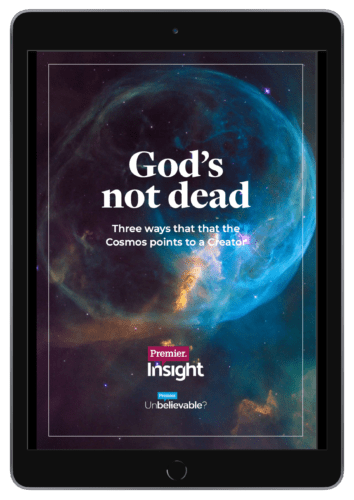
Can we make evangelicalism great again (but not in that way)?
Posted:Has western evangelicalism become sexist, politicised and power-obsessed? If so, what’s the solution? Erik Strandness reflects on the recent Unbelievable? livestream interview with Professor Kristin Kobes Du Mez, author of Jesus and John Wayne.
A Force for Bad?
Christianity was once the air the West breathed but for many it has been replaced by a harsh evangelical wind that blows cold. Professor Kristin Kobes Du Mez in her bestselling book ‘Jesus and John Wayne: How white evangelicals corrupted a faith and fractured a nation’ makes the case that evangelicalism has become a divisive force in both religious and secular realms. Is she correct? Has Evangelicalism really corrupted faith and divided our nation or is it an important corrective against liberal Christianity and the last defense against cultural deconstruction? She sat down with Justin Brierley on Unbelievable? to discuss these important issues.
Public Relations
I found her retelling of the history of popular evangelicalism quite interesting but felt she concentrated on the abuses and spent very little time chronicling its positive contributions. Evangelicalism isn’t unique. I doubt if you will find any response to cultural change, conservative or liberal, that doesn’t become extreme even if it was initially well-intentioned. She highlights the sins of the evangelicals but the secular world has also fallen victim to the same excesses.
Kobes Du Mez is appropriately critical of the way evangelicalism has been promoted in the media but we need to keep in mind that any entity that seeks to promote itself appropriates time tested propaganda techniques. If you want to sell something then you find muscular males and attractive females to tell others that the products they promote are integral to a happy life. You appeal to the most fundamental unit of society, the family. And you manufacture an enemy, real or perceived, to give it a militaristic urgency. I don’t support this approach, I just want to point out that it’s a marketing strategy that’s not unique to evangelicalism.
Many of the components of popular evangelicalism with which she takes issue didn’t originate in the Bible but were imposed from on high by the marketing acumen of a series of calculating leaders who wanted their ideas to become more mainstream. It was less an orthodox ideology than a movement to consolidate political power. I, therefore, think we need to be careful when we attribute the views of these media savvy talking heads to the evangelical hoi polloi because popular consumption doesn’t automatically mean that Christians have drunk the Kool-Aid.
Manly Men
She describes how John Wayne became the poster boy for Biblical manhood despite his less than God-fearing past. Is it possible that Wayne’s masculinity was more of a public relations ploy rather than a pillar of evangelicalism?
Macho men aren’t inherently Christian, in fact, John Wayne was just one in a line of many historical characters who embodied heroism and toughness. The machismo of figures such as Marduk, Zeus, Nebuchadnezzar, Caesar, Flash Gordon, Superman, James Bond, and Indiana Jones, has universal appeal and therefore makes for an effective marketing tool. Sadly, Christians have coopted the worldly power paradigm ever since they hooked up with Constantine and established the first Christian nation. Power characterized by strong, white, military leaders has always been a part of history but should have nothing to do with a crucified Middle Eastern criminal, who said the first would be last, the highest rung on the leadership ladder was a servant, and that God’s power was found in weakness. We, therefore, need to be very careful when we paint the scarlet letter of white muscular male supremacy on all evangelical Christians.
Trumping Evangelicals
One of the prime examples of divisive evangelical power she offered was the election of Donald Trump.
“How could white evangelicals betray their values and vote for a man like Donald Trump who seemed to stand against all of their values that they held most dear?” (12:45)
She concluded that evangelical support for Trump made sense once one drilled down to the foundations of evangelicalism. He was a white, tough guy who spouted militaristic rhetoric.
“A vision of masculine leadership, of masculine heroism that champions doing what needs to be done, champions whatever the cost, violence to achieve righteousness.” (13:35)
Justin pointed out that many Trump supporting evangelicals “weren’t looking for a bully or a strong man (but) were looking for someone who would represent (them) at the ballot box.” She appropriately pointed out that this line of reasoning may explain his election to the presidency but didn’t explain why he was chosen as the nominee of a party with such a strong evangelical base. Certainly, more thoroughly vetted Christians with less social baggage such as Ted Cruz or Marco Rubio would have been better choices.
I think she failed to consider the American People’s frustration with politics as usual. Donald Trump was an outsider, a businessman who embraced a conservative agenda, yet who seemed capable, unlike professional politicians, of bringing it to fruition. Evangelicals were willing to gamble on a flawed outsider to actually get things done. Historically, Republican politicians had paid lip-service to the big-ticket issues of abortion, crime, and government overreach but in Trump they saw someone who might actually get these things accomplished
Character isn’t Leadership
The Clinton presidency made it politically possible to separate moral virtue from the ability to govern. Republicans, not wanting to miss the opportunity to play their own get-out-of-philandering-jail free card were willing to ignore Trump’s troublesome past in order to put forward a strong leader. While she implied that this exposed the true face of popular evangelicalism, I think it can be argued that what it actually revealed was the willingness of Christians to overlook personal failings if it meant major issues like abortion, dissolution of the family, and crime might finally get addressed.
Trump wasn’t nominated because he was a masculine white evangelical but because he was an outsider who didn’t bow to politically correctness. You knew exactly what you were getting with Trump because he wasn’t entangled in complicated webs of political special interest. In addition, many evangelicals knew that even if Trump self-destructed, Mike Pence, a solid Christian, was waiting in the wings ready to take control.
Riding Political Coattails
Much of the vocal support for Trump from prominent evangelicals made the rank-and-file cringe and it was a tragedy that he wasn’t called out for his behavior. The popular press, however, was more than happy to hand megaphones to those who inappropriately elevated him to savior status. The evangelical Trump debacle wasn’t unique because Christians have a history of slobbering over worldly leaders. Eusebius, writing in 335 A.D., almost deified Constantine despite the fact that his faith was suspect, all because he opened up the halls of earthly power to Christianity
Hence is our emperor perfect in discretion, in goodness, in justice, in courage, in piety, in devotion to God: he truly and only is a philosopher, since he knows himself, and is fully aware that supplies of every blessing are showered on him from a source quite external to himself, even from heaven itself. Declaring the august title of supreme authority by the splendor of his vesture, he alone worthily wears that imperial purple which so well becomes him. (Eusebius – Oration in Praise of Constantine)
Biblical Gender
Kobes Du Mez believes that hypermasculinity and patriarchy have become significant problems for cultural evangelicals and attributes it to a perceived crisis of masculinity. She faults various leaders for promoting a faulty vision of Biblical manhood characterized by male authority, strength, and militarism.
I appreciated her hesitancy to define Biblical manhood or womanhood and to concentrate on the shared image we bear. We are all capable of receiving the gifts of the spirit and the last time I checked the fruits of the spirit were genderless. God created humans in his image, male and female he created them, therefore we should spend less time dissecting them and more time combining them into a divine whole as Jesus did.
“We are all given one model, we are all called to follow Jesus Christ, women and men, to follow Jesus Christ. So I think we should be asking much more – what does it mean for each of us as we are created, as we are made, as we find ourselves to pattern our lives after Jesus Christ.” (32:33)
Military Metaphor
One of her concerns is the frequent use of military metaphors to describe evangelical Christianity. I agree that they can stir up images of muscles, might, and masculinity when we are supposed to follow a Jesus who calls us to service, sacrifice and surrender, but she needs to separate the military from the political ways it is applied. Personally, I tear up every time I encounter someone in the military not because they are lean mean fighting machines but because I know they are willing sacrifice their lives for mine. I suspect her problem with a military motif is the political implementation of it and not the selfless service of those who carry it out. While I have no doubt that the military can kick some serious butt they do so at a high personal cost. The recent withdrawal of the United States military from Afghanistan highlighted this distinction because some of most striking images were those of soldiers holding babies that had been passed over barbed wire and not successful drone strikes. We may not like the wars instigated by our politicians but we must respect the service of our soldiers. If being a soldier means laying down one’s life for another then I think it serves as an appropriate Christian metaphor. It’s the politics of the politicians and not the morality of the military that gives militarism a bad name.
Defining or Pigeonholing
Cultural evangelicalism didn’t appear in a vacuum but was a response to liberal overreach. I think a case can be made that communism is bad, families are better off when they are intact, and sexual freedom has led to STD’s, abortions and the marginalization of children. The evangelical diagnosis was correct, but as happens with just about every other controversy in the world, the response generated a whole new set of problems. Abuses of power cannot be corrected by a new set of power abuses.
While she made a successful case for the excesses of cultural evangelicalism, she ultimately offered no solutions except hope that there will be some sort of “Evangelical reckoning or soul searching.” Perhaps the term “evangelical” has outlived its usefulness. Even Kobes Du Mez acknowledges that the term can be problematic and warns us to “Pay attention to who gets to define evangelicalism and then how they’re defining it.” As happens with so many other labels, it no longer defines but pigeonholes.
I personally would prefer to be called a “Jesus Follower.” While many would say the term lacks doctrinal gravitas, I would argue that it tells people everything they need to know about my faith. And if they are curious enough to find out who I follow they don’t have to rely on a historian, theologian, or sociologist to describe Him, all they have to do is open up the Bible and take Him at His Word. It’s reassuring to know that despite cultures insistence that we give ourselves alphabetic identities, Christians can best be categorized by a series of Red Letters.
Erik Strandness is a physician and Christian apologist who has practiced neonatal medicine for more than 20 years.
Watch the Unbelievable? interview with Prof Kristin Kobes Du Mez
